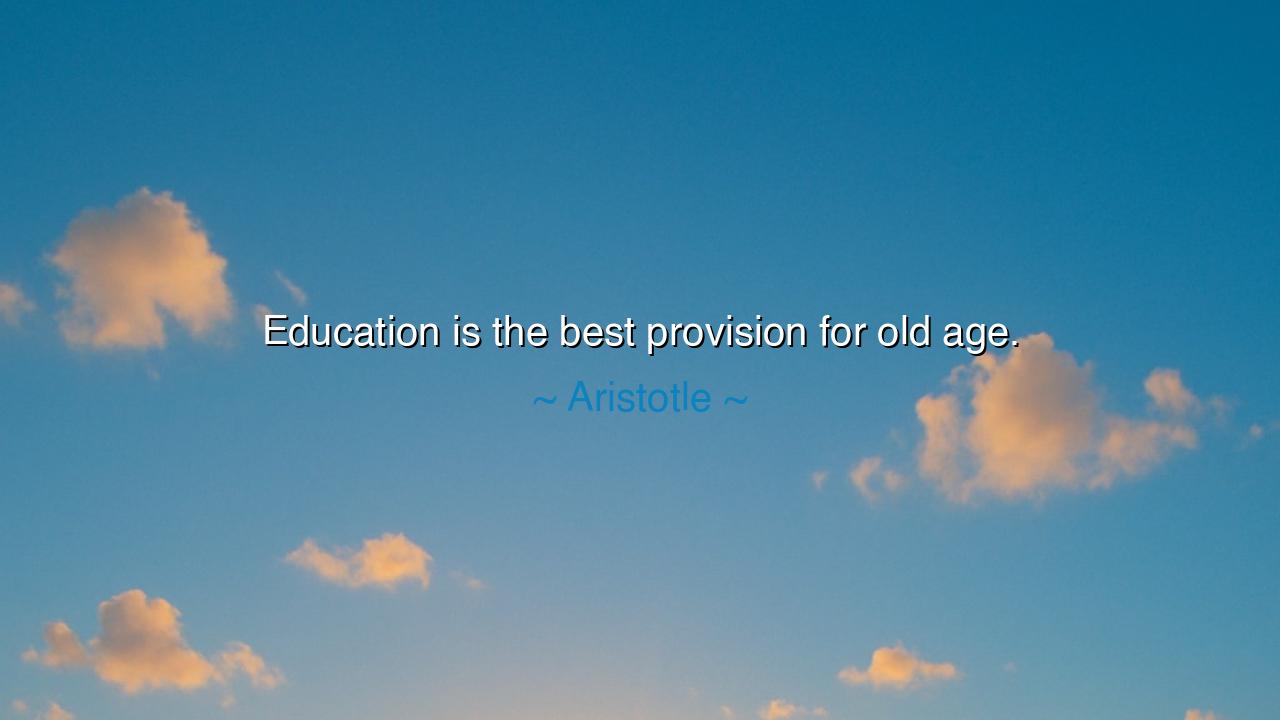
Education is the best provision for old age.






"Education is the best provision for old age." These profound words from Aristotle capture the essence of a life well-lived. Education, for the ancient Greeks, was not merely about acquiring knowledge but about shaping the soul, refining one’s character, and preparing for the inevitable passage of time. Aristotle understood that old age does not simply bring physical decline, but also the risk of mental and spiritual stagnation. To be educated is to arm oneself with wisdom and insight that will sustain the mind, heart, and spirit long after the body begins to fade. In this quote, Aristotle suggests that true fulfillment and dignity in old age come not from material wealth or physical vitality, but from a lifelong pursuit of learning and the development of the mind.
In the philosophy of the ancients, education was seen as the foundation of virtue and wisdom. Socrates, the father of Western philosophy, famously said that the unexamined life is not worth living. For him, education was not simply about memorizing facts, but about questioning and examining one’s own beliefs, actions, and understanding of the world. To live an examined life—to be aware, to be critical, to be reflective—is to be truly alive in every stage of life. Socrates himself, even in his old age, continued to engage in dialogue and philosophical debate, never ceasing to seek the truth. It was this commitment to education—to continuous learning—that allowed him to maintain a sharp mind and a noble spirit, even as his physical body aged.
Consider the example of Plato, Aristotle’s teacher, whose Academy became a beacon of intellectual pursuit in ancient Athens. Plato’s lifelong commitment to education enabled him not only to contribute immeasurably to philosophy but also to shape the thinking of generations to come. Even in his later years, Plato’s works continued to influence those around him, and his pursuit of knowledge kept his mind ever sharp, engaged, and productive. Plato’s legacy teaches us that education—the cultivation of the mind—is not a task for the young alone, but a lifelong journey that can shape our entire existence, including our old age.
In more recent history, the life of Benjamin Franklin serves as another example of how education can serve as a powerful provision for old age. Franklin, though famous for his scientific experiments and political achievements, was deeply committed to learning throughout his life. Even in his later years, Franklin continued to explore new ideas, engage in correspondence with intellectuals, and seek to improve himself. His ability to adapt, to learn, and to grow mentally kept him vibrant even as his physical strength waned. Franklin’s life shows that education does not merely serve as a means to an end but as a perpetual source of vitality that sustains us through the inevitable changes of life.
Aristotle’s teaching on education also points to the idea that in old age, we are faced not just with decline, but with the opportunity to reflect, to pass on our wisdom, and to continue contributing to society in meaningful ways. The true value of old age, as the ancients saw it, lies not in the accumulation of years, but in the wisdom one gathers and shares. For those who are educated, the passage of time becomes a time to guide, to mentor, and to offer the gift of knowledge to younger generations. Education ensures that old age is not a time of obsolescence but of continued growth and purpose.
The lesson we take from Aristotle’s words is clear: education is not just a tool for the young; it is the bedrock upon which we build our character, our understanding, and our contributions to the world. It is the best provision for old age because it allows us to continue growing, adapting, and remaining engaged with life, no matter how many years we have lived. Learning, at every stage of life, keeps our minds sharp, our spirits active, and our hearts open to the world around us. It is through education that we find the strength to endure, the wisdom to guide others, and the peace to accept the inevitable changes of life with dignity.
In practical terms, we must commit to the idea that learning is a lifelong endeavor. We must continue to engage with the world, to read, to study, to question, and to reflect. As we age, it is easy to fall into the trap of passivity, of believing that we have learned all there is to know. But in truth, education becomes even more important in our later years. It is through education that we remain relevant, informed, and connected to the world around us. Let us seek to grow every day, no matter our age, and understand that the most valuable provision for old age is not wealth or physical health, but a mind that remains engaged and ever-curious, ready to contribute, reflect, and live fully.






AAdministratorAdministrator
Welcome, honored guests. Please leave a comment, we will respond soon